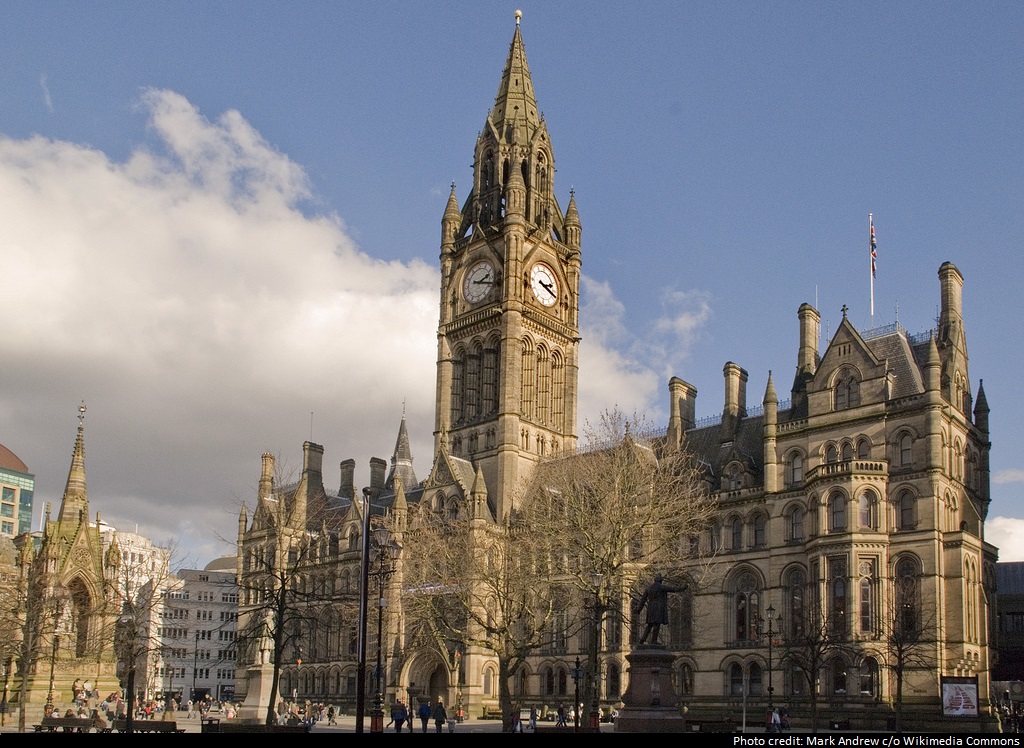
Manchester is England's second biggest legal market after London. It's home to more major firms than you can shake a stick at with more offices opening up here all the time. Liverpool, though of less importance as legal markets go, is still a significant North West business hub.
Manchester
It's fair to say that we associate Manchester with many things. Industrialisation. Rave and bucket hats. Football glory. Mod haircuts. Oasis. Marx and Engels. Trams, canals, Corrie and the actual Albert Square. Nicknamed 'Cottonopolis' during the Victorian era because of its role as a centre for textile manufacturing, Manchester was the world's first ever site of unplanned urbanisation. While cotton spinning boomed, engineering, chemical and financial companies also sprang up and flourished.
The city also developed into a seat of learning and culture, with two universities, renowned music schools and a world class orchestra, the Halle. Post-war regeneration helped Manchester to snatch the title of Britain's second city (though it often fights with Birmingham for the crown). The BBC's move to the rejuvenated Salford Quays area has also established the city as a serious media hub, with plenty in the way of theatre, restaurants and nightlife – all the trappings of a modern metropolis. So, with much business booming, it's unsurprising that Manchester – the UK's third most visited city – has overtaken Leeds as the North's legal capital.
Pretty much every major national firm has a well-established and significant presence in Manc. These include the country's biggest national hitters – Addleshaws, DLA Piper, DWF, Eversheds Sutherland, Pinsent Masons and Irwin Mitchell – as well as more modestly-sized national outfits like BLM, Squires, Shoosmiths, Gateley, Mills & Reeve and Kennedys.
In addition, it's fair to say firms without a long-established base in the city have been going mad for Manchester in recent years. Established regional and national firms are now having to share territory with City players looking to 'northshore' some of their work by launching support offices outside the capital where rent and overheads are cheaper. In 2015, US-based giant Latham & Watkins announced it was to set up a support base in Manc, as did magic circle member Freshfields and City stalwart Berwin Leighton Paisner. Such Northern branches may be 'low-cost' support centres, but they do come with legal job opportunities. For example, Freshfields is set to launch legal apprenticeships in the city.
There are also a clutch of firms which have set up beefier, full-service offices in Manc. London human rights aficionado Leigh Day opened its doors here in 2014 with a dedicated personal injury and medical negligence practice and is now set to offer training contracts here. Other out-of-towners which have recently opened offices in the city and watched them grow are Newcastle's Ward Hadaway, Bristol's TLT and City firm Clyde & Co.
The success native Manchester firms (like DWF) have had in expanding nationally and the allure of the city to outsiders has had a rather odd effect: there are now no large true-blue Manchester firms (or for that matter North West firms). The two closest examples are Brabners (which is pretty small and also has an office in Liverpool) and Hill Dickinson (which also has big offices in London and Liverpool, where it started life). What this means is that if you want to train at a large commercial firm in Manchester you can only choose from firms with offices across the country.
Liverpool
Liverpool is home to two top football clubs, three universities, one of the largest ports in the UK and a brimming retail scene. While the city is nearly as large as Manchester in terms of population and offers its inhabitants many of the same social and cultural amenities, its significance as a legal hub is not as great as that of its inland sister. In terms of size, the legal market is more like that of smaller cities like Nottingham or Newcastle.
DLA Piper has more trainees in the city than any other firm, with ten under its roof at the time of our 2017 research. Liverpudlian native Hill Dickinson followed with eight, while Brabners and DWF had six each.
These numbers could be set to rise, as there'll be be plenty of demand for Liverpudlian lawyers to help push the government's Northern Powerhouse project over the next few years. Experts have estimated that the scheme could create more than 850,000 jobs in the North, upping the value of goods and services produced in the region by some £97 million come 2050. Investment in transport is touted as a key driver of growth, so in the coming years expect particular demand in the Merseyside market for real estate, projects, rail, infrastructure and public procurement lawyers.
Studying in a given city is a good way to convince employers you're invested in the region, so aspiring lawyers wishing to check out Liverpool for themselves should have a gander at the LPC options on offer at BPP and Liverpool John Moores. On that note, the education sector remains an important contributor to Liverpool's economy. Some concerns have been voiced over the future of scientific research in the city following the Brexit vote, as the University of Liverpool was the recipient of £49 million in EU grant funding between 2007 and 2013. Few assurances have been offered as to where future support will come from, so as new policies are rolled out in the years ahead Liverpool's technology and education sector bodies are likely to keep their legal advisers on speed dial.
With Liverpool FC and Everton ever-ambitious, there's always lots of exciting sports-related work on offer too. Brabners was always a hard-hitter in this department, but the aptly named Centrefield is now the one to watch with nine of Brabners' sports law gurus leaving to form this sports and media law boutique in 2015.